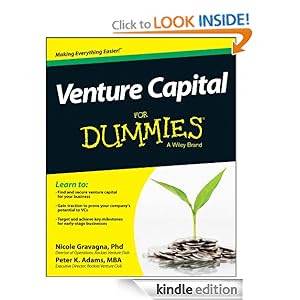Creating an Angel Investor Certification Test
 Many professional organizations have a certification test of competency that members must pass to demonstrate their knowledge and ability to perform at a high level. Doctors, Lawyers, CPA’s and other professions must also take continuing education credits as well.
Many professional organizations have a certification test of competency that members must pass to demonstrate their knowledge and ability to perform at a high level. Doctors, Lawyers, CPA’s and other professions must also take continuing education credits as well.
The criterion for being an angel investor, however, has nothing to do with knowledge and does nothing to provide the knowledge that an accredited investor needs to know to both make good investments and to exercise prudence with regard to their portfolio strategy. Accredited investors qualify to be angels simply by wealth (having assets in excess of $1 million) or income, (having annual income of $200K per year or more, or $300K for married couples)
The SEC has proposed recently that a knowledge based criterion for accredited investors be added. This would allow people with expertise to participate in angel investments. The proposal, however, suggested that existing certifications such as a FINRA Series 7 might be a good benchmark. Having passed the Series 7 test myself, I can assure anyone that the knowledge one acquires to pass that test, though it is significant, has nothing to do with what someone needs to know to be an angel investor. Angel and venture capital investing has its own set of language and guidelines that have very little overlap with what a Series 7 certificate holder would have. If the goal of accreditation is to protect the investors from themselves, then providing a certification that tested knowledge that was relevant to the asset class would be most useful.
A good certification test for angel investors would include several parts. Here’s an overview of what it might look like.
- Portfolio strategy. The presumed reason for the accredited investor guidelines is that people of high wealth have excess money to lose and can withstand a complete loss. Just having money to lose isn’t really a great way to build a portfolio strategy. Smart investors will allocate approximately ten percent or less of their investable portfolio into the angel investing asset class. Within that ten percent, they will be invested in a minimum of ten deals and preferably twenty or more. That means that a marginally accredited investor with a $1 million in investable assets will create an angel investing portfolio of about $100,000 which will be in at least ten $10,000 deals or even twenty $5,000 deals. Someone with a $5 million investable portfolio will put $500,000 to work in angel deals, perhaps with twenty deals at $25,000 each. Some angels really spread out their risk with fifty or more deals and it’s generally agreed that the more deals you can get into the better. Finally, angels should understand the difference between making a “one and done” investment in a company vs. follow-on investments and how they can benefit a portfolio.
- Exit strategies. Angel investors have only one way to get their money back and that’s through an exit. Anyone investing in this asset class should have a sophisticated knowledge of how exits work, how to analyze the market for exit potential, what typical exit multiples are and what the typical exit amounts are for startups in any particular industry. An angel who doesn’t understand exits will not likely do well as an investor and may end up investing in a lot of great ideas that never see a liquidity event.
- There are some who say that “valuation doesn’t matter”. These are the VC hacks who think they can make up for any valuation by investing only in “unicorns” ( private companies that reach a valuation of $1 billion or more). That’s a great theory until you realize that only one in several thousand deals results in a unicorn deal and most that exit at all will exit for under $50 million. For these, understanding valuation and putting together a fair deal is critical. A smart angel should have a valuation toolbox under their belt with several different valuation methods available to them.
- Due Diligence. Smart angels know that the more diligence you do, the better your chances for investment success. Just having lunch with a startup CEO and getting excited about their passion and commitment is not a good way to do diligence. Investors should thoroughly investigate the market, the team, the product, IP and legal landscape, valuation, comparable transactions, financial projections, competition, exit potential, key documents and agreements and much more.
- Term Sheets. Investing requires good knowledge of the terms used in negotiating the deal. These terms are far from obvious and many that sound similar can result in a difference of millions of dollars when the company exits. g. “preferred liquidation preference” or “participating preferred”. I’ve seen angels who have caused serious problems for themselves and the companies they invest in by creating situations that make follow-on investment by VCs all but impossible.
- Securities and Tax Law: Angels should be familiar with the various points of securities law to understand the registration exemptions that offerings are using, and to know the boundaries of proper securities offering processes. They should understand the difference between Regulation D 506B and 506C registrations, the proper filing of Form D, numbers of investors allowed, and verification of accredited investor status. They should also understand tax law as it applies to angel investment including Section 1202, 1244, and 1045 as well as state breaks for economic development and federal breaks for research and development.
- Proformas and financial analysis. Like it or not, there’s a lot of finance knowledge required to be a good angel investor. Being able to look at a proforma and understand if it’s believable, or just a “hockey stick” graph someone put together to make it look good. A proforma is a treasure trove of information about the company, its strategy and how it expects to operate. Even though it’s never going to be right, the way that the information is presented gives the investor a window into how the CEO and team thinks. Finance risk is significant for most companies and understanding how many future raises will be required, how big they will be and what the cumulative dilution to both founders and investors will look like is critical to assessing the potential for the deal.
- Market Analysis. Understanding the trends in a market, competition, actual pain points and return on investment for customers is one of the most important parts of understanding the viability of a deal. These require sensitivity to the particulars of specific industries and are not easy. Many startup founders are technical wizards and they may have some insight into the needs of their markets, but many have no idea about how to create a go-to-market strategy, assess which channels are appropriate for their market, or how to allocate scarce resources to create the lowest Cost of Acquiring a Customer relative to the highest Lifetime Customer Value. Many startups are blind to their competition and claim that they “have no competition.” This should cause any investor to run from a deal. Creating “virality” is an art that is lost on many tech or healthcare founders and angels should be able to assess the viability of the market strategy.
- Post Investment Management and Serving on Boards. The work of the angel investor is just beginning after the check clears. Managing the investment after the check requires expertise to help ensure alignment and to guide the CEO towards the best exit opportunities. Serving on boards carries fiduciary responsibilities.
Unlike the questions for the FINRA Series 7 exam, most of the knowledge required for angel investing certification centers more around principles, definitions and best practices rather than distinct points of law. Only about 10% of the angel certification test is about specific regulations and point of law, yet the knowledge the test represents is what angel investors should know. This ratio represents the ratio of technical to legal know-how in other professional exams and would represent a step-up in the professionalism of angel investing.
The SEC has set income and asset limits to the definition of accredited investors with good intention. Unfortunately, simply having wealth does not make one qualified to make good investments and there are plenty of stories of wealthy people making imprudent investments that resulted in disaster. Better to allow a criterion based on knowledge, so that investors understand how to balance risk and opportunities through diversified investments and well accepted principles of successful angel investing. We hope the SEC will consider this certification as a means to becoming accredited, and open up angel investing to a broader audience while accelerating American economic development through greater investment in our job creating startups.
Peter Adams







